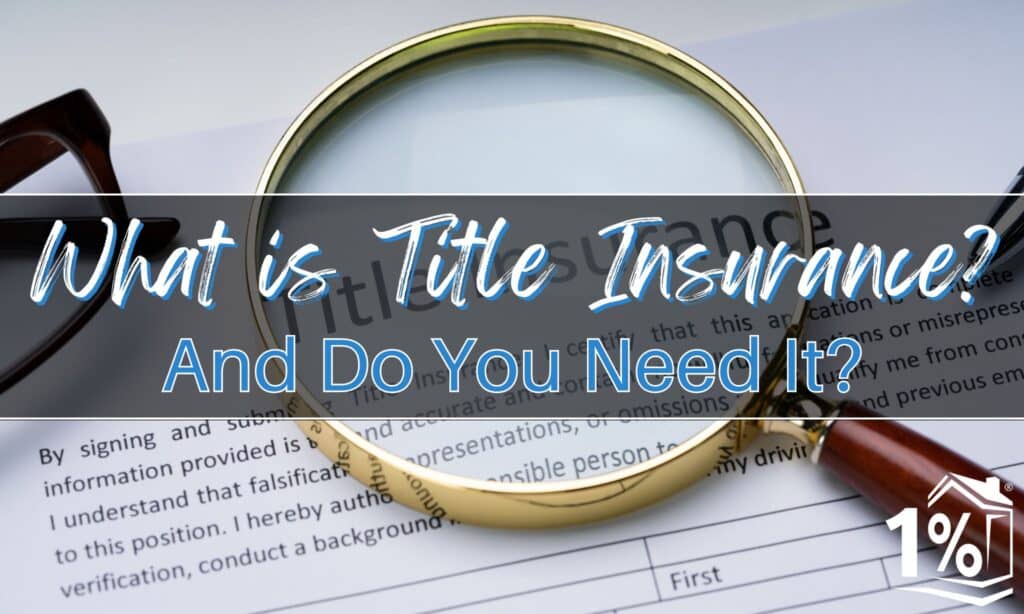When buying a house, obtaining a legal title is an important step. This legal concept confirms you’ve received ownership rights from the seller. What happens if the sale is marred by legal or financial issues? Unexpected complications could end up costing you more than your new home’s purchase price.
Title insurance can help. When you are looking to buy a house, title insurance should be a priority. This article will explain how title insurance works and why it is so important.
What is title insurance?
Title insurance protects homebuyers and mortgage lenders against financial loss or damages caused by title defects. Title insurance policies usually cover the most common claims made against a title including liens, taxes, and conflicts of wills.
A title problem can be caused by many things, from code violations to complicated legal issues. After purchasing a home, you may discover that the seller has no legal claim on it, or that another party disputes their claim.
How does title insurance work?
You don’t want to spend a lot of money on a house, only to discover that the title is invalid due to an unexpected problem. Title insurance protects you against this.
You’re less likely than not to run into these issues if you work with a title company. However, it’s still worth having a policy. Title companies provide policies along with their title search. This is the process by which they verify that the seller has legal rights to transfer title to you. Title insurance protects buyers and lenders against any defects in the title which could cause significant losses.
Let’s take a closer look at the types of coverage that title insurance policies provide.
What does title insurance cover?
Title insurance comes in two forms: lender’s and owner’s. They both provide protections to different parties in a real-estate transaction. It’s important that you know the differences between them and what each covers.
Owner’s title insurance policy
The majority of owner’s policy policies are bought as a protection against possible hazards. An owner’s insurance policy is optional but protects home buyers from most risks.
- Will disputes and other conflicts involving conflicting claims of ownership
- Liens, lawsuits and other encumbrances on the property invalidate the legal claim of the seller
- Public records that are inaccurate or flawed, even if they contain honest mistakes such as incorrect signatures
- Fraud and/or outright forgery
- Unreported easements and other agreements which may reduce the value or limit the use of the property
It’s not mandatory to purchase an owner’s policy. However, it’s a good precaution and can give you more peace of mind. There’s a chance that even if you hired a company to do research on the property, something could slip under the radar.
Lender’s title insurance policy
The lender will require that the borrower purchase title insurance before they can obtain a loan. This policy is typically issued by the title firm to signify the completion of the search.
Its basic function is similar to that of a policy for owners: it protects the lender from potential losses if the seller cannot legally transfer title rights. Up to the amount of the loan, the lender is covered. This policy protects only the lender.
A lender’s insurance policy won’t cover you if you’re liable for back taxes, but a policy on the owner’s title will.
Warranty of title: an alternative to title insurance
A warranty of ownership is a promise by the seller to ensure that the property belongs to them and no one else. The warranty gives the buyer the right to sue the seller if it is discovered that another person has a claim against the property.
Some transactions do not include a title warranty by default. In estate sales, auctions, and other similar situations where the seller is acting as a representative, rather than an owner, a title warranty may not be included, since the representative does not know of any competing claims. A home buyer might still consider a title policy in such a case.

What is the cost of title insurance?
Title insurance rates can vary depending on your insurance provider and where you live. A policy may cost between $500 and $3,500. The cost of an owner’s insurance policy can be included in the price of a property if the seller purchases it.
A third party such as a real estate agent will usually initiate the insurance process after the purchase agreement is completed. This process often requires both a lender’s policy and an owner’s policy in order to protect all parties. The one-time cost can be used to purchase both policies.
How can you lower your title insurance cost?
In states where title insurance is more regulated, home buyers will not see a big difference in the cost of their policy. Check your state’s laws to determine how you might lower your title insurance costs.
Do you really need title insurance?
Owner’s insurance is optional. Although lender’s coverage is almost always required. Owner’s title policies can have dire consequences if you don’t purchase them. Unpaid property taxes, outstanding debts or fines due to code violations will only be the responsibility of the homeowner who is not insured.
The homeowner is protected by title insurance for as long they own their property. If you are unable to cover these costs, you may be responsible for much more than you expected.
If you are unable to pay these new payments, then your home may be forfeited to the entity who has come to collect, and this is all without your fault. Any problems with the chain can be covered by title insurance. Your dream home could quickly turn into a nightmare if you don’t have title insurance.
Title insurance protects you from financial loss
The process of buying real estate can be stressful. There are many ways to protect your finances, such as title insurance. This can give you peace of mind. When you are ready to begin your home search, choose the best title company to assist you.


